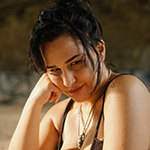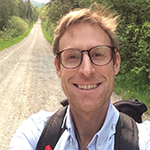we never had to name our sons after Jesus
Those who looked up at him from the ground, behind palms
shielding the sun, did not lower his body
from the cross today either.
hands clasped beneath their chests, they did not
reach out to one another but stood apart in a pride justified
by their lamentation at bearing witness to the punishment.
this before our own caliphs approved of taking sides.
beneath the scratchy fabric that cloaked my body, I stitched
my eye to my groin, my mind to the quick of my nails, the feeling of
my headscarf’s fold,
I took in the faces of whoever was there at the cross
and brought them to you.
“Here’s the prophet, here’s the camel,” my milk-sibling
whispered in my ear—I didn’t like the way he raised his brow.
In this world on which my ass sits or my soles stand,
what sense is there in taking blood as if it were a progress payment?
because I tore the cloth from my head
and used it to soak up all the mottled liquid from those wooden beams.
today they did not take Christ down from there, nor did they
find the killers of the children shot at the police barricades today.
we’d talked about it all that afternoon, twelve women
at our gold day, our second meeting after Muhlis Bey’s heart attack
and Besime Hanım’s first hysterectomy,
“He hung on the cross exactly thirty days, rotted, and the crows ate him,”
said Huriye the hostess, slipping another gold coin down her shirt.
they ate their mosaic cake and mumbled
thank God we never had to name our sons after Jesus
I would never forget their faces as they did.
“Here’s the dirt, here’s the people,” my milk-sibling
yelled—I never liked the way he’d pinch me.
I was sent to schools and enrolled in courses,
calligraphy, ballet, piano and folk dance—hopefully
we’ll do something from the Caucuses—
but I wish I knew how to talk to a board
whenever blood is spilled, I wish I’d told my mother I wanted
to be enrolled in a course that helped me know at a single glance
the kind of tree that cross had been carved from,
“Don’t you dare nail him to a spruce.”
it was only after eight funerals, six weddings and thirteen births
that I understood it was my classmate Abdullah
who’d been crowned with thorns.
after three separate beatings he had to stand on one leg
in front of the chalkboard, both arms held out, his urine dribbling
down his columnar leg because he couldn’t hold it anymore,
I’ll clean his shame with a big towel
thank God there aren’t many children in our class named Abdullah.
Bargain-counter cologne, unruly beard, the smell of
wet feet after his ablution, and right in the middle of our house.
we set up a scarecrow to keep the crows away from my father’s
homemade sausages, a long board with short arms nailed to it.
at the behest of my grandmother, who was reluctant to draw a face
on the scarecrow, we tied two long black strips of cloth to its arms. we made
a turban out of fabric leftover from Huriye Hanım’s trousseau and hung it
on the top of the post—we’d been wiping the floor with it for the past ten years,
you could hardly see its flower pattern anymore.
“Here is the woman, here is the field,” they commanded the public,
and I resented my milk-sibling for finding me a husband.
Even as we consume every halal thing to the end, we have neighbors
deluded enough to believe we can find another country from
a fiber of meat in our teeth. there are those who said
they never ate pork, and we countenanced their lies
so they cut special willows for everyone
without delay, free of inertia, nailing chic crosses without
exactly measuring their short and long angles.
our duty was to listen to the confession of atheism with pleasure
and infuse ourselves with the evident power of pure Muslim faith.
at the celebration for her grandchild’s fortieth day on earth,
Gülsüm Teyze explained all this with elegance and grace,
while the smell of bargain-counter cologne wafted upwards
from the baby’s neck wrapped in muslin cloth and struck my nose.
Our eighth trip to the same exorcist
and the demons won’t come out, the hodja is bushed,
he prays, blows air, jumps up and down at regular intervals,
“They didn’t take Christ down from there today, they didn’t
find the corpses of the women burned on the side of the road today.”
after a while, we know how to say destur to our inner demon
and begin to extinguish our teacher’s fire
with three kuluvallahs and a nas,
protecting our national solidarity and unity
from the evil eye.
“Here’s the seat, here’s the law,” they said among themselves,
and I was so offended by my milk-sibling’s drool.
I wondered what to do with the tax deducted from my salary
in this life of mine whose fragrant edges are adorned with roses,
on the evening of my milk-sibling’s wedding, which I’d been invited to,
all those lessons and courses would finally come in handy—
maybe they’ll play a Caucasian tune—
but when I saw the gold that Besime, Huriye and Muhsin Bey’s
widow pinned to the bride and groom’s chests,
I was amazed to see it there for the first time
because the relief on the gold coin wasn’t Atatürk’s head.
Those who looked at them from the ground, with eyes they’d closed
with both hands, did not collect their dead from the djemevi today.
I neatly lined up their faces one by one, male and female,
but my milk-sibling didn’t know the Elham
and reversed the yem yelid and the yem yelüd.
I caught him one afternoon under our scarecrow
greedily chewing sausages shaped like a crow’s beak.
instead of getting a turban, my hair was cut and tied
because I told everything I saw, opening a new front against crows.
this makeshift cross gets so big it falls over,
and the scissors cut wounds into my head.
“Here’s the sausage, here’s the crow,” he defended himself,
my milk-sibling’s face looked like Petrus’.
The fifty-eighth time we were brought to the same hodja,
my bothersome curse still didn’t go away,
so I took it and brought it
here to you.
Translator’s Note:
This is an excerpt from Nazlı Karabıyıkoğlu’s semi-autobiographical novel Elfiye, which we’re hoping will soon find a publisher. The novel tells the story of a Turkish poet and academic who, in the middle of completing a groundbreaking translation of an Ottoman-era sex book, exiles herself to Georgia after being declared a terrorist for signing a petition calling for peace in Southeastern Anatolia. The novel is in prose, but lengthy sections of it are told in highly referential, stream of consciousness, free verse poetry that deal with Elfiye’s sexual orientation and her family’s suppression of it throughout her childhood.
This section takes place just before Elfiye decides to leave Georgia for good. She’s been invited—lured, more like it—by her former professor to join him in New York so they can finish their work on the aforementioned sex book under the patronage of Columbia University. Not only has Elfiye done the translation, but she’s also written the articles and abstracts herself, all without receiving any official credit, and her professor has invited her because he can’t actually finish the job himself. Naturally, Elfiye is reluctant to go. Above the little Georgian town she’s exiled herself to, there looms a large cathedral which looms large in her mind as well. As a child, Elfiye was indoctrinated to believe that a Muslim—even a now nominal one like her—should not enter a non-Muslim house of worship, lest she become possessed by a djinn. But she goes anyway, hoping to find some guidance. While she’s there, she composes the following “hymn.”

Nazlı Karabıyıkoğlu is an author and LGBTIQ* activist who has published four story collections and one novel, and co-founded the #MeToo movement in the Turkish publishing industry. Due to political and gender repression in her home country, she now lives in Germany. She also drew attention from the US literary scene with her last novel Elfiye in the field of queer writing. She has been accepted to the Master of Human Rights program at Friedrich Alexander University. She is currently a PEN Writers-in-Exile fellow. nazlikarabiyikoglu.com

Ralph Hubbell is a writer, teacher and translator whose fiction, essays, and translations have appeared in the Sun Magazine, Words Without Borders, Los Angeles Review of Books, Tin House’s Lost and Found, Asymptote, and elsewhere. In addition to Nazlı Karabıyıkoğlu, he has also translated Oğuz Atay’s short story collection Waiting for the Fear, which will be published by NYRB Classics in late 2023.

 BACK TO ISSUE
BACK TO ISSUE